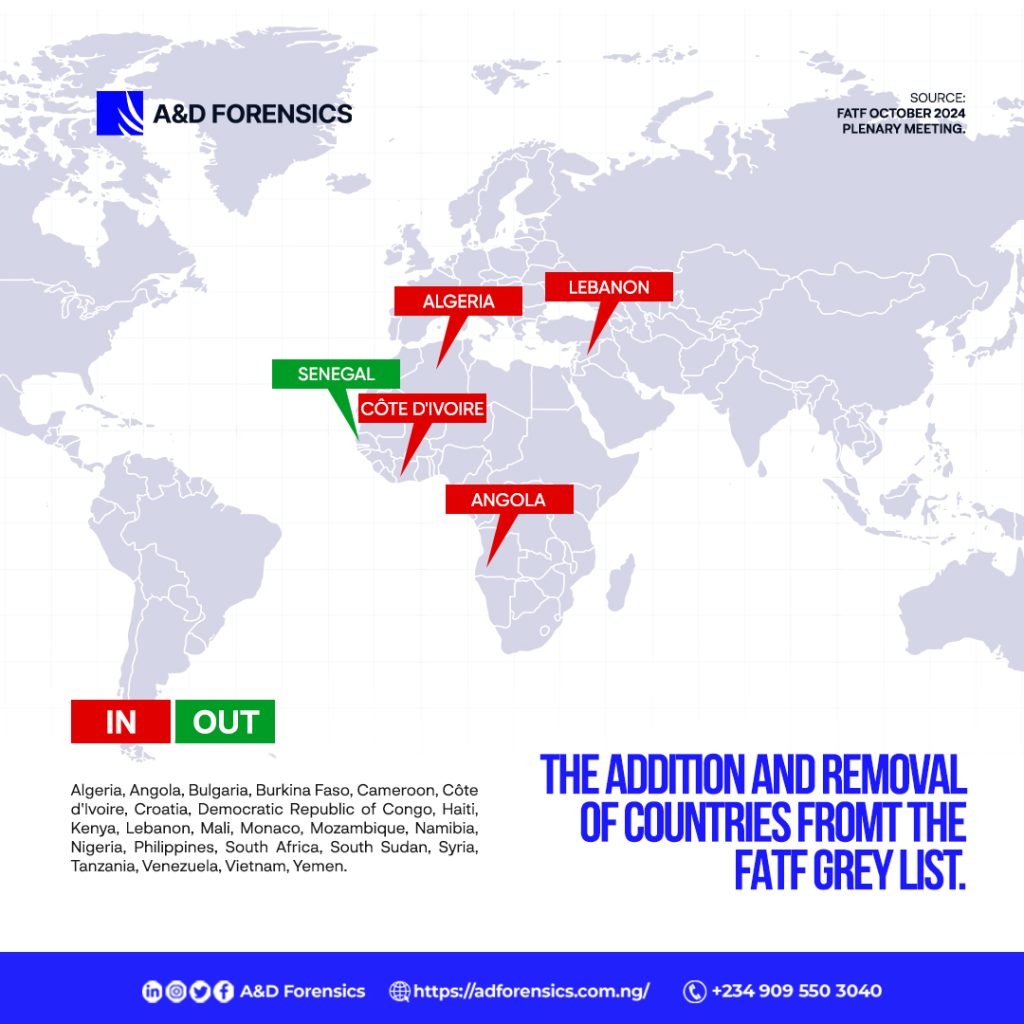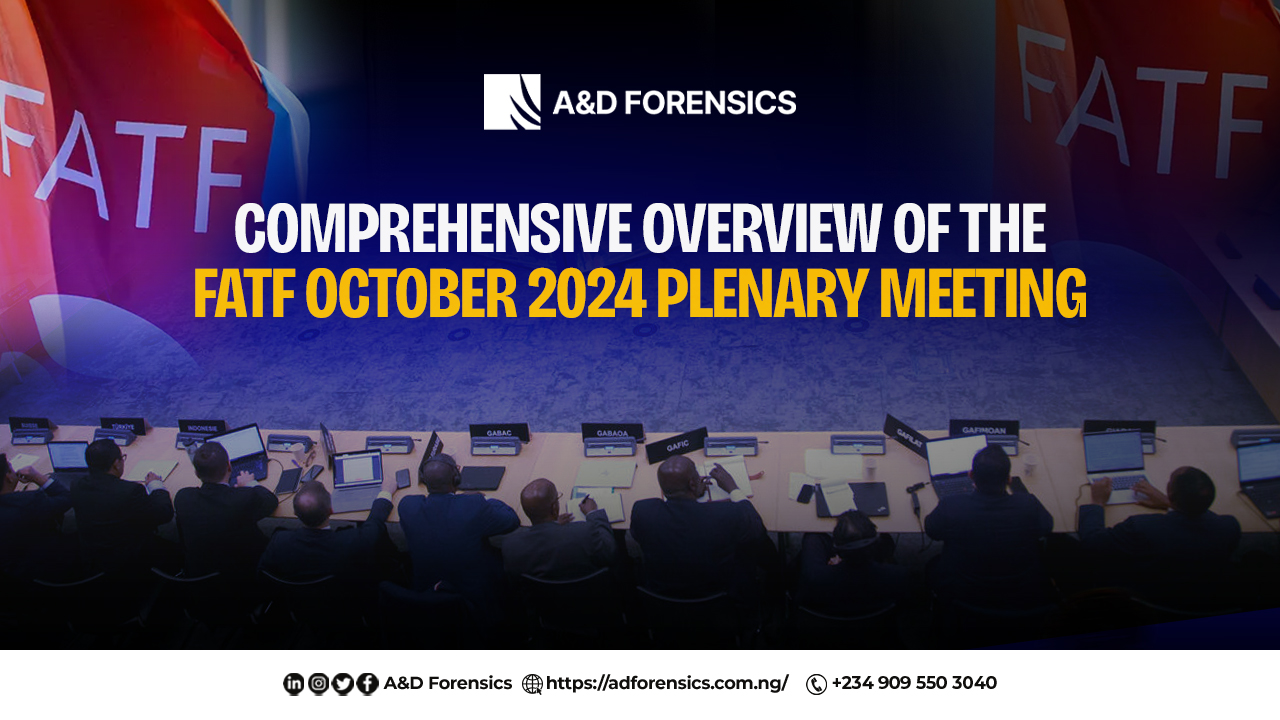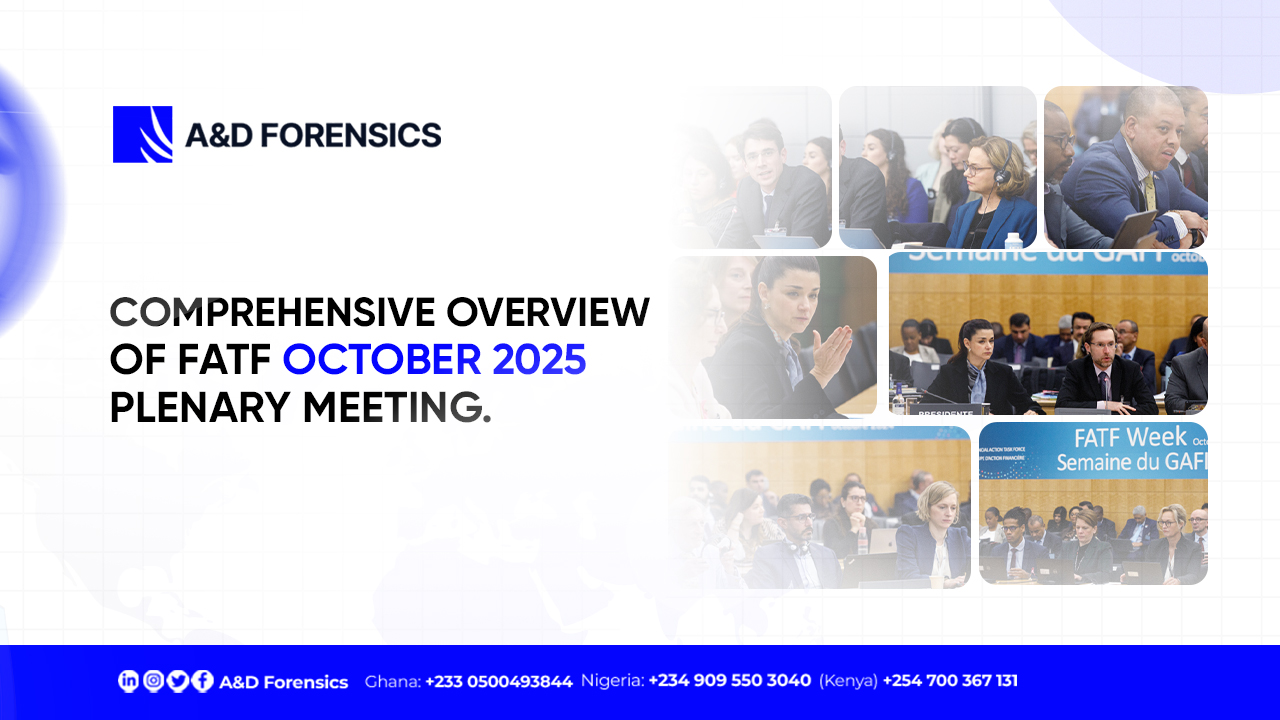The Financial Action Task Force October 2024 plenary meeting was the first plenary under the Presidency of Elisa de Anda Madrazo of Mexico concluded within 23th – 25th of October, 2024 with significant developments in global anti-money laundering (AML) and counter-terrorism financing (CFT) efforts. Over three days, delegates from 200+ jurisdictions and international organizations discussed issues that highlight FATF’s evolving role in combating money laundering, terrorist financing, and proliferation financing.
FATF October 2024 Plenary Meeting Changes to the Grey List And Black List.
The FATF October 2024 plenary meeting made adjustments to its grey and black lists by adding and removing some countries from its Grey list, while the FATF black list remains unchanged. The countries involved are: Senegal (out), Algeria, Angola, Côte d’Ivoire, and Lebanon (in) as shown in the image below:

Meanwhile, Nigeria remains on the grey list, to which it was added under the presidency of T. Raja Kumar of Singapore in February 2023. Being grey-listed can help the country correct its issues and boost its economy, while also serving as a warning against more severe measures on the blacklist.
Addition to Grey List: Algeria, Angola, Côte d’Ivoire, and Lebanon.
During the FATF October 2024 Plenary meeting, Algeria, Angola, Côte d’Ivoire, and Lebanon were added to the list of jurisdictions subject to increased monitoring due to deficiencies identified in each country’s Mutual Evaluation Report (MER). The reports highlighted critical issues, including a lack of effective risk-based supervision, inadequate transparency in beneficial ownership information, and insufficient investigations and prosecutions related to money laundering and terrorist financing.
Removal From Grey List: Senegal
Senegal has exited the FATF’s increased monitoring list following significant progress in strengthening its AML/CFT framework. Since being added to the grey list in February 2021, the Senegalese government has implemented targeted financial sanctions as recommended by the FATF and enacted new legislation to combat illicit financing.
The FATF October 2024 Plenary meeting marked the final evaluation reports for the year, with Argentina and Oman concluding as the last reports.
Completion of the FATF’s Fourth Evaluation Cycle and New Mutual Evaluations Reports.
FATF has officially completed its fourth cycle of Mutual Evaluation Reports (MERs), concluding with the adoption of the final reports for Argentina and Oman.
Argentina: At the FATF October 2024 Plenary meeting, the joint FATF-GAFILAT assessment highlighted progress in Argentina’s domestic coordination efforts. However, it underscored the need for further improvements, particularly in prosecuting money laundering linked to corruption and informal financial systems. Compliance teams working in Argentina should stay updated on regulatory developments as the country implements additional reforms.
Oman: Oman was recognized for advances in financial intelligence utilization and international cooperation at the FATF October 2024 Plenary meeting. However, it was advised to strengthen measures to prevent the misuse of legal entities in financial crime. Compliance teams associated with Oman should anticipate an increased focus on ownership transparency and due diligence practices.
During the FATF October 2024 Plenary meeting, Ms. de Anda noted that the FATF’s fifth cycle will introduce ‘more focused, risk-based mutual evaluations,’ with reports tailored to address each jurisdiction’s unique risk profile.
Additional Key Developments from the FATF October 2024 Plenary meeting.
1. Revised National Risk Assessment
Following the FATF’s July 2024 consultation, updated guidance on national risk assessments will be released in 2025. This guidance, aimed at countries with limited resources, will help enhance the ability to identify and mitigate financial crime risks. During the FATF October 2024, the FATF has revised its grey-listing criteria to focus on jurisdictions meeting specific referral criteria, including FATF members, high-income countries (excluding those with small financial sectors), and countries with financial sector assets over USD 10 billion. Least developed countries will not be prioritized unless they pose significant risks.
2. Promoting Financial Inclusion through a Risk-Based Approach
During the FATF October 2024 Plenary meeting, members agreed to open a public consultation on proposed revisions to the FATF Standards, particularly Recommendation 1, to enhance financial inclusion. These changes, inspired by findings from the FATF’s Stocktake report, address the underuse of the flexibility allowed under the risk-based approach. The revisions encourage countries to adopt simplified measures where lower risks are identified.
3. Enhancing Collaboration Across the Global Network
Under its Mexican Presidency, the FATF has prioritized elevating the role and involvement of regional bodies (FSRBs) within the FATF’s Global Network. At the FATF October 2024 Plenary meeting, members committed to strengthening regional support to ensure high-quality, consistent evaluations across the network. Additionally, the FATF President launched an initiative inviting guest jurisdictions, beginning with Senegal and the Cayman Islands, to contribute actively and foster regional engagement.
4. Current Initiatives and Emerging Projects
Delegates received updates on ongoing FATF initiatives at the FATF October 2024 Plenary meeting:
- Revised FATF Standards for Cross-Border Payments: Updates aim to align standards with changes in cross-border payment systems and industry practices.
- Terrorist Financing Risks Update: A comprehensive review of terrorist financing threats is underway.
- Online Child Exploitation Detection Project: This initiative focuses on identifying suspicious financial indicators related to online child sexual exploitation, addressing a rise in this crime and working to protect vulnerable populations.
- Data Protection and Privacy Collaboration: A new project focuses on information sharing for AML/CFT/CPF, in collaboration with data protection experts, the private sector, and international partners, ensuring compliance with national regulations.
- Protection of NPO Activities: The FATF has launched a review to ensure that FATF requirements are not misused to restrict non-profit organizations’ activities.
5. Women in FATF and the Global Network (WFGN) Initiative
The Plenary reviewed efforts to improve gender diversity within the FATF and discussed proposals to enhance these initiatives. Building on the WFGN initiative from the previous Singapore Presidency, the FATF will launch a second mentoring program aimed at promoting inclusivity and diversity within the FATF and Global Network.
Update on Russia’s Suspension from the FATF October 2024 Plenary Meeting.
The FATF reaffirmed its February 2024 decision to suspend Russia and urged jurisdictions to monitor potential risks related to Russia’s attempts to circumvent sanctions. FATF members are encouraged to remain vigilant against transactions that may indirectly support Russian activities under international sanctions.
What steps should compliance officers take?
Compliance officers should stay informed about the outcomes of the FATF October 2024 Plenary Meeting, especially regarding upcoming Mutual Evaluation Reports (MERs) in the jurisdictions where they operate. Following changes to the grey list, businesses must adjust risk assessments for affected countries and ensure that due diligence measures are applied accordingly. Key dates for upcoming FATF guidance should also be tracked, as these will impact national regulatory frameworks.
The next FATF plenary is scheduled for February 2025.
You can find the previous plenary coverage from A&D Forensics here:
Contributor: Ibrahim Anuoluwapo Azeez






